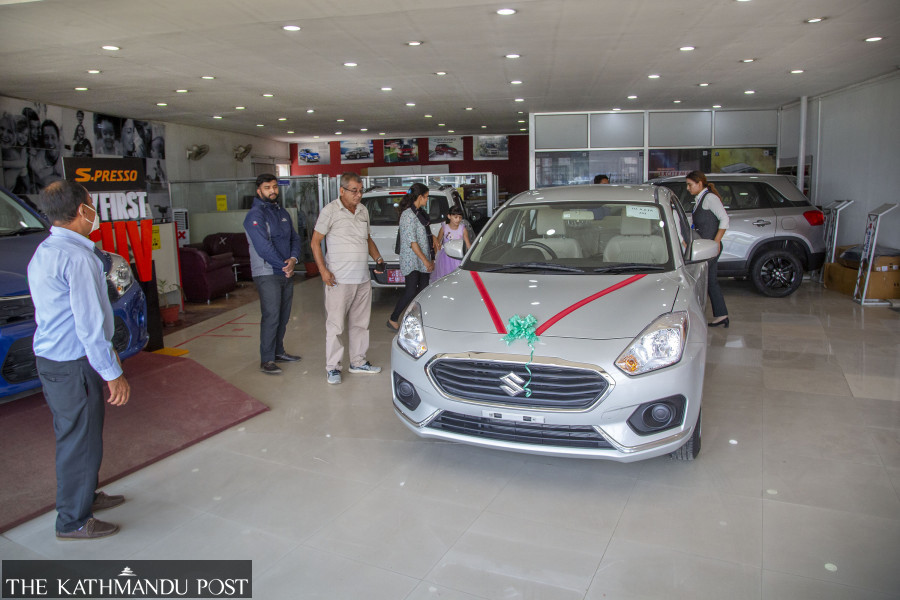Money
Auto sector sees weaker recovery amid third wave fears
A decline in consumer confidence and loss of disposable income has spread gloom in the market, insiders say.
Krishana Prasain
Auto sales are below last year's post-lockdown figures with potential buyers fearing a third wave of the Covid pandemic and another stay-home order, car dealers said.
A decline in consumer confidence and loss of disposable income due to the second wave has spread gloom in the two- and four-wheeler market, according to industry insiders.
Siraj Pant, general manager at CG Motocorp, the sole distributor of Suzuki cars in Nepal, said the current four-wheeler market was not as exciting compared to the market that perked up after the lockdown was lifted last year.
“Customer confidence has not built up amid fears of a third wave compared to what it was after the first lockdown last year,” he said.
"The second wave of the coronavirus pandemic and the lockdown that was imposed to contain it hit every part of the economy one more time, resulting in a slowdown," Pant said. "Even customers who have made bookings are in a wait and watch mode due to the virus uncertainty."
Krishna Prasad Dulal, president of the Nepal Automobile Dealers’ Association, said that demand for automobiles was lower than last year when the market reopened. "But there is still demand in the market," he added.
Sales have been shrinking by several percentage points every year for the last five years after the government jacked up the minimum down payment to 50 percent, he said.
“But I do not think the coronavirus has impacted auto sales, and it will not have any effect in the future either,” Dulal said. "Sales figures will reach the same level as last year."
According to Dulal, car prices have not increased so much either; but supply has been hit with Indian manufacturers just restarting production after closing down due to second wave.
"We have not been able to sell as many cars as we had hoped to during the period mid-June to mid-July," Pant said. The Suzuki distributorship had set a sales target of 400 passenger vehicles by mid-July.
"Suzuki car prices were increased after the first lockdown, and the company does not plan to review them for two-three months," he said.
According to the Trade and Export Promotion Centre, Nepal imported motor vehicles and parts worth Rs88.58 billion in the first 11 months of the current fiscal year, a 43.2 percent jump year-on-year.
During the same period in the last fiscal year, the import bill amounted to Rs61.85 billion.
"The effect of the pandemic on the automobile sector is starting to show," said Punam Singh, assistant general manager of Hansraj Hulaschand and Co, the sole distributor of Bajaj motorcycles in Nepal.
Sales had boomed soon after the lockdown was lifted last year, but this time it is a different story, Singh said.
People were terrified of commuting by public transport because of the possibility of contracting the virus, and this helped push up sales despite the economic slowdown following the lockdown last year.
Demand for two-wheelers had observed aggressive sales growth, according to domestic automobile dealers. The awful public transportation system in Kathmandu Valley has been a boon for auto sellers, and sales have remained strong as a result, dealers said.
“As infections spread rapidly during the second wave, leading to a breakdown of the healthcare system, people have realised how they can save money should a third wave hit,” Singh said.
“Consumer necessity has shifted in the current situation with less disposable income. Most people have been impacted somehow by the pandemic and its economic consequences,” she added.
"Commuting has declined with many organisations implementing a work from home policy, and demand for private vehicles has slowed. The cost of a motorcycle has risen by Rs2,000 to Rs3,000 depending on the model as prices have increased at source," Singh said.
The continuous rise in fuel prices might also have contributed to lower sales, said dealers.
India fulfils most of Nepal's automobile requirement. According to Indian media, car prices have swelled along with higher input costs resulting from price rises in raw materials like steel and other metals.
Maruti Suzuki India, Nissan Motor India and Toyota Kirloskar Motor have decided to increase prices of their vehicles from April while Honda and Tata are preparing to do so.
As per reports, the hike in prices might have a greater impact on sales of two-wheelers, especially entry level motorcycles, compared to passenger and commercial vehicles.




 10.12°C Kathmandu
10.12°C Kathmandu













